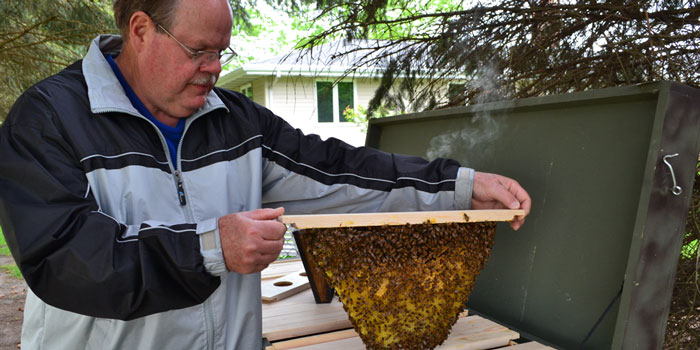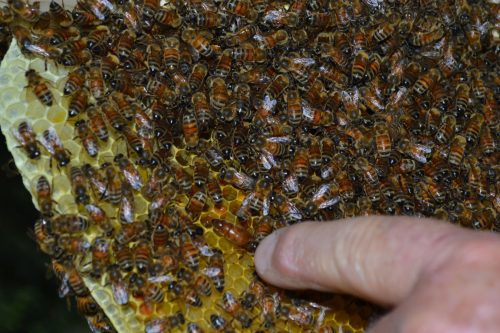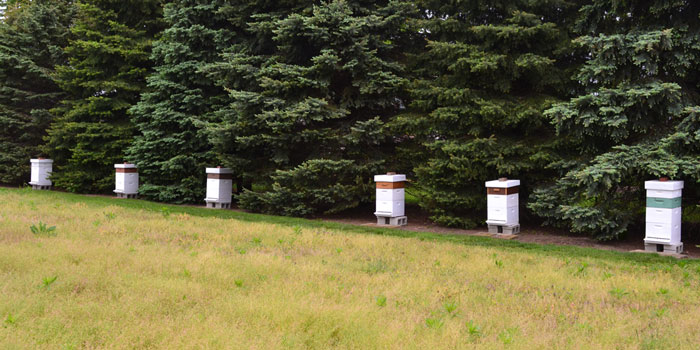Spreading The Buzz About Honeybees

Stan Ide removes one of the combs from his top-bar hive, similar to what is used in parts of Africa. Honeybees play an important role in not just creating honey, but in pollinating other foods humans like to eat, such as fruits, berries and vegetables. The threat of colony collapse has inspired some people to take up beekeeping. (Photo by Sarah Wright)
WARSAW — Stan Ide’s hobby has kept him “abuzz” for about 20 years, and while he may have downsized from 60-some hives to seven when he moved closer to Warsaw, he still enjoys beekeeping.
“I grew up on a farm,” he said, adding his grandfather also kept bees. “Ag is my thing.”
Ide, who also has a ministry at Manchester University, said he purchased his first hives at an estate sale.
“We came back that night to load them up,” Ide said, noting that is the only time to move hives since during the day worker bees are active. From those first hives, his colony count only grew. “People would call about swarms they’d found.”
In those days, Ide supplied his surplus honey to Cerulean Restaurant in Winona Lake, Warsaw Health Foods and Slater’s in Sidney.
“Now it’s just a hobby,” Ide said, adding nowadays he spends a lot of his time with fellow beekeepers as a mentor.
In fact, Warsaw has a group of beekeepers who meet and try to have six honeybee forums each year.
“There are about 25 beekeepers, all from around the Warsaw area,” Ide said, noting 33 people are on the mailing list, which provides meeting details, helpful information about keeping honeybees and informative bee-related YouTube videos.
So far, the group has not formed an official club; however, Ide said it could be in the future.
“People would be surprised by how many (beekeepers) are around Warsaw,” he commented, adding they come from all walks of life and include doctors and lawyers. Even Hephzibah House and Grace College keep bees. “I would say 90 percent of them are hobby beekeepers.”

Honeybees form highly organized societies, with various bees taking on specific roles during their lifetime, such as nurses, guards, grocers, undertakers, foragers, etc. Ide commented, “They are the smartest of all insects.”
Here, Ide points to the queen bee, which has a longer abdomen that is more amber colored compared to the other bees. She will also live three to five years versus the six weeks of a worker bee in summer; at most, workers can live four to nine months in the winter season. (Photo by Sarah Wright)
As for what draws them to beekeeping, Ide said there are numerous reasons such as counteracting colony collapse disorder, a global phenomenon. Additionally, Ide said, “People are always looking for local honey.”
Unlike store-bought honey, local honey comes from local flowers and isn’t heated to 140 degrees so it won’t crystallize into sugar as it waits for the consumer to purchase and eat it; the heating and filtering process used with store honey also destroys some of the natural pollen found in honey. Additionally, local honey often comes from the same batch of flowers while store honey is often a blend of many different batches.
“A friend of mine had a hive by sunflowers,” Ide explained. “It was very bitter, so it was sold for cooking purposes only.”
In fact, each season offers a different crop of honey. “In spring you have the black locust, wild raspberry, tulip trees,” Ide said, noting these make a light-colored honey.
Mid-summer is when clover honey makes its appearance. In September the golden rod and wild asters emerge. “It makes a darker, fruitier honey,” he said.
August tends to be a dry month as is, of course, winter, with Ide commenting unlike with other livestock, he gets to have the winters off while the bees cluster for warmth.
“My goal is to help people in the area who are interested in honeybees, but have questions on how to get started,” Ide said. He added they try to divide up more experienced beekeepers with the less at forums so they can mentor each other.
For those interested in learning about beekeeping or need help to get started, contact Ide at [email protected] to get on the mailing list or call (574) 376-4655. Ide will also be speaking about honeybees at the Northern Indiana Lakes Festival at 5:30 p.m. Saturday, June 11, in Center Park.

Ide has six box hives, protected from the wind by a grouping of pine trees. The hives’ exits face a nearby field. Once his honeybees grow acclimated to their new surroundings, Ide estimated they’d create 36 gallons of honey. (Photo by Sarah Wright)
